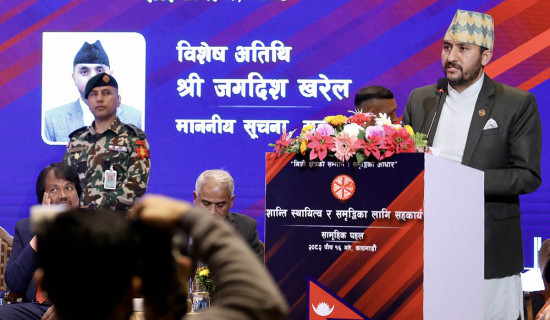- Thursday, 1 January 2026
Social Protection Ensures Human Rights
Social protection has increasingly been realised as a crucial instrument to realise fundamental human rights. The conventional notion of taking it as unproductive expenses has been challenged. This is because a number of studies have revealed the transformative role of social protection in improving people’s living conditions globally. A 43-member global social protection informal lobby group, with humanitarian, human rights and economic justice background, has recently asked the governments and international financial institutions to commit for creating social security systems that ensures human rights. The group stressed for ending policies that have been failing millions of people by putting them in poverty and inequality. The spirit of the call is to change ongoing policies to create a humane world where everyone gets opportunities to enjoy basic human rights.
Cognizant of recent global crises and the need to establish a just world, the lobby group’s call states that amid mounting poverty and soaring inequality, where millions grapple daily to realise their economic, social and cultural rights, we cannot afford to maintain social security approaches that fail to deliver these rights. It further stresses that “governments and international financial institutions have an opportunity to course-correct and adopt a rights-aligned approach to social security that sets the tone and leads the way toward more just societies and economies.”
Social security
The group maintains that “social security is one of the cornerstones of human rights, sustainable economies, and just societies. It is enshrined in numerous legally binding international treaties and is provided through a set of public policies and programmes often known as social protection. These programmes ensure income security throughout an individual's life, offering support during life events such as childbirth, old age, illness, disability, unemployment, and circumstances such as climate disasters that elevate the risk of income insecurity, such as the earthquake.” It is seen that such events occur at various stages of our life-cycle. Least developed countries such as Nepal are more prone to such vulnerabilities.
The call presents a compellingly weak situation of human rights compliance around the globe. It argues that the right to social protection for all is enshrined in the 1948 United Nations’ Universal Declaration of Human Rights and yet, 75 years later, global social protection falls shamefully short, with more than half of the global population lacking basic coverage, violating human rights. This is clearly an under achievement on the part of the global community; a huge gap between saying and doing. Nepal’s social protection coverage is less than global average and stands only at 32 per cent of the population.
Recognising the critical role of international financial institutions in shaping global economic and social policies that bear on social protection, the call has noted that “the international financial institutions bear immense responsibility for achieving universal social protection, but it's imperative to shift away from an out-dated economic model that often endorses austerity measures. The workers’ call is clear: scaling up social protection financing, an investment for societies which dramatically reduce inequalities while boosting employment, skills, productivity, demand for goods and services, and overall GDP growth.” It is interesting to note here that the call has challenges the existing economic models as many heterodox economists and thinkers have been calling for the last 30 years. The failure of this model is evidenced by global conflicts, corruption, poverty and inequalities. Nepal has also observed these occurrences after it has liberalized its economy in the 1990s.
The call has also underscored the need for universal social protection. It has noted that many governments rely on social security programmes that are means-tested, in which eligibility hinges on income, assets, or narrow poverty indicators. The call has substantiated some research showing that these programmes have often become ineffective because of high error rates, corruption, and social mistrust. Focusing only on people in poverty or extreme poverty also excludes large segments of the population, including those who are not officially considered poor but are far from experiencing economic stability. It is obvious that people’s living condition changes in the face of multiple vulnerabilities and crises. Nepal’s poverty card has failed miserably because of high inclusion and exclusion errors. The campaign call has also noted that “there are more and more civil society organisations who see through the statement that ‘poverty-targeting is pro-poor’.
Strategy
In fact, universality is pro-poor, in line with human rights and a key strategy to promote social justice.” Narrow targeting is also costly as it demands for the identification of absolute poor through some type of survey. The call has categorically concluded the wrongness with the past flawed approach and demanded “that the international financial institutions got behind a modern system of universal life cycle social security system that ensures that everyone can receive protection from childhood to old age and, importantly, helps rebuild trust in government, democracy and strong social contracts.” This is clearly a call for the establishment of a good society where harmony, peace and happiness prevail. This is because of the power of universal social protection in creating fairer and more stable societies, and not just charity.
In the absence of this, “instability, social defiance, and polarisation are growing and the needs for resilience are greater than ever in the face of the climate crisis” stated the call. The call has concluded that some countries have also eroded the right to social security, leading to reduced coverage and benefits. In some countries, these changes, supported by the World Bank or IMF, involved cuts to employer contributions or reduced benefits for the majority in the public system. Additionally, privatisation of social insurance in some places has worsened poverty and inequality, disproportionately affecting women and older people.
(Dr. Bhusal is an expert in poverty, employment and social protection.)
















